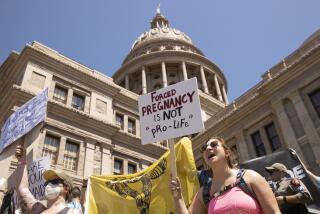Breast Cancer Link Is Rejected
Having an abortion or a miscarriage does not raise a woman’s risk of developing breast cancer later in life, according to a large study being published today in the medical journal the Lancet.
The report, written by an international consortium of scientists, analyzed 53 studies involving 83,000 women with breast cancer.
It found that these women were no more likely to have had a miscarriage or abortion earlier in life than women without breast cancer.
The report is the most exhaustive ever on the topic of breast cancer, abortion and miscarriage, containing at least 90% of the world’s studies on the issue, said Dr. Valerie Beral, an epidemiologist at Oxford University and one of the paper’s lead authors.
The question of a link between abortions and breast cancer has been controversial. Some studies have detected a heightened breast cancer rate in women who have had abortions, while others have not.
Last year, a workshop of more than 100 scientists convened by the National Cancer Institute concluded that there was no evidence of a heightened risk. Only one member dissented on the findings.
In the paper reported today, Beral and colleagues took a closer look at the 53 studies and grouped them according to the quality of their design.
The best and most reliable studies were those of a “prospective” design, in which abortion records were obtained for the women before their diagnosis of breast cancer. These studies accounted for 44,000 women.
In these studies, the accuracy of reporting abortions and miscarriages should be similar for the women who later developed breast cancer and the healthy women they were compared with.
When examined as a group, the prospective studies showed no link between abortions or miscarriages and breast cancer.
Less reliable were the “retrospective” studies, which accounted for 39,000 of the women. In these, women who knew they had breast cancer were asked whether they had ever had an abortion or miscarriage.
The problem with these studies is that breast cancer patients may have been more likely to report an abortion or miscarriage than the healthy women they were compared with, because they were searching for a cause for their illness. Thus, it could look like breast cancer was more common in the group that had abortions, even if it was not.
“People who have a serious illness scour their lives more thoroughly than people who haven’t,” said Dr. John Glaspy, an oncologist and researcher at UCLA’s Jonsson Comprehensive Cancer Center, noting that similar biases have been reported in studies exploring a link between breast cancer and dietary fat.
“It’s part of a normal human trait that we search for a cause when something dramatic happens in our lives.”
Leslie Bernstein, a professor of preventive medicine at USC’s Keck School of Medicine and a coauthor of the Lancet paper, noted that women in Texas seeking abortions are now required by law to be counseled that the procedure may raise their risk of breast cancer.
“They’re being told something that ... to the best of our knowledge isn’t true,” Bernstein said.
The study reported today is one segment of a collaboration of nearly 200 scientists examining the effect of lifestyle and environmental factors on breast cancer risk. Some of the factors they have explored include the use of oral contraceptives, tobacco and hormone replacement therapy.






